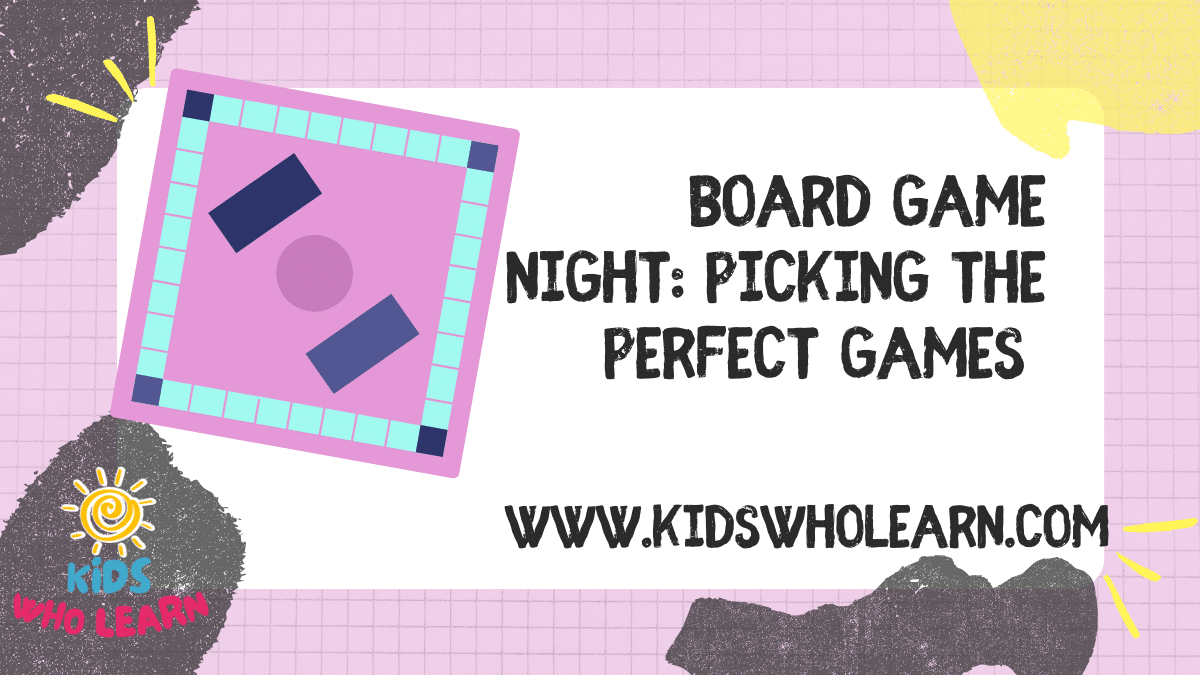Engaging in a board game night can be a delightful way to bond with your family and friends, offering both entertainment and opportunities to create lasting memories. Choosing the ideal games to play is crucial to ensure that everyone, regardless of age or personal interest, has an enjoyable experience. To pick the perfect games for your family gathering, it’s important to consider the various preferences and skill levels of the participants.
The world of board games offers a vast selection, from strategic endeavors that challenge the mind to lighthearted party games that induce laughter. Recognizing the different types of games available is the first step in making an educated choice that will cater to your family’s tastes. Once familar with the genres, you can focus on factors like game complexity, duration, and the educational value, ensuring that the selections encourage participation and engagement from all family members.
Key Takeaways
- Select games that accommodate family members’ interests and skill levels.
- Balance game types for varied interaction and educational benefits.
- Aim for engaging everyone to create a memorable and fun game night.
Understanding the Different Types of Board Games
Board game nights are an excellent opportunity for fun and learning. Selecting the right type of game can enhance critical thinking, communication, and specific skills depending on the game’s focus.
Strategy Games
Strategy games are designed to challenge your strategic thinking and decision-making abilities. Players often compete to gain resources, control areas, or complete objectives, with games like Settlers of Catan and Risk being notable examples. These games usually require a significant amount of reasoning and planning ahead, making them more suitable for adults or older kids. They emphasize:
- Critical Thinking: Evaluating the current situation and planning multiple steps ahead.
- Strategic Decision-Making: Choosing the best actions to achieve long-term objectives.
Luck-Based Games
Games that rely on luck are often more accessible for all ages, as they minimize the need for complex strategies. Players may draw cards, roll dice, or spin wheels that largely determine the game’s outcome, as found in Candy Land and Chutes and Ladders. These games can still reinforce:
- Math Skills: Through counting spaces and managing simple points systems.
- Communication: Encouraging interaction and social skills among players.
Fast-Paced Party Games
Fast-paced party games bring a burst of energy to game night, often requiring quick thinking and rapid responses. Games like Taboo or Pictionary engage adults and kids alike in a frenetic, interactive experience that focuses on:
- Communication: Fostering clear and rapid conveyance of ideas under time pressure.
- Fast-Paced Thinking: Making immediate decisions and reactions to dynamic game play.
Educational Games
Educational games are tailored to combine learning with fun, covering topics like history, geography, or science. They might be explicitly designed for a classroom setting or simply incorporate educational content in an engaging way. For example, Scrabble boosts vocabulary and Ticket to Ride can teach geography. Key attributes include:
- Math Skills: Many educational games include elements that encourage players to perform calculations or manage resources.
- Reasoning and Language Skills: Depending on the subject matter, these games often require logical thinking and language comprehension.
Key Factors for Selecting Family-Friendly Games
Selecting the ideal board game for family game night involves considering the preferences and abilities of all members. Choose wisely to ensure engaging, enjoyable, and inclusive family time.
Age Appropriateness
For a game to be suitable for children and appeal to your entire family, check the age recommendation on the box. It’s important to select games that match the cognitive and emotional maturity of younger players.
- 3-6 years: Look for games that stimulate imagination, use simple rules, and require short attention spans.
- 7-12 years: Games can involve more strategy and longer play times.
- Teens: Opt for games with more complex themes and mechanics.
Ease of Learning
An easy-to-learn game ensures everyone gets to join the fun quickly, minimizing frustration. Opt for games that:
- Have clear, concise rules.
- Can be explained in under 10 minutes.
- Feature straightforward objectives and gameplay.
Games that are easy to learn facilitate bonding and leave more time for playing rather than deciphering rules.
Game Duration
Family game nights often have a limited window, so game duration is key:
- Short games (15-30 minutes): Best for quick fun or when including very young children.
- Medium games (30-60 minutes): Ideal for a well-rounded session that holds attention without causing fatigue.
- Long games (1 hour+): Suitable for older children and if you plan a dedicated evening for gaming.
Level of Interaction
A good family board game promotes teamwork and positive interaction:
- Cooperative games: Encourage working together, which can boost family solidarity.
- Competitive games: Should be balanced with a focus on fun rather than aggressive competition.
Prioritize games that require players to engage with each other, supporting both social skills and family bonding.
Popular Board Games for Family Game Night
Creating joyful memories around the table starts with choosing the right game for your family. Whether your group favours strategy, creativity, or classic roll-and-move games, the following selections will cater to various ages and interests.
Classic Favorites
Engage in time-tested enjoyment with Classic Favorites that have become the backbone of family game nights.
- Monopoly: Navigate the highs and lows of real estate with this economic strategy game.
- Scrabble: Expand your vocabulary as you form words in this iconic crossword game.
- Clue: Uncover the mystery as you deduce who done it, with what, and where.
- Uno: Use color and number matching skills to play this universally beloved card game.
Modern Hits
Explore Modern Hits that bring fresh mechanics and themes to the forefront of board gaming.
- Ticket to Ride: Build your railroad empire across countries or continents in this easy-to-learn but engaging game.
- Azul: Become a tile-laying artist as you compete to craft the most beautiful mosaic.
- Wingspan: Attract a variety of birds to your wildlife habitat in this strategy card game.
- Exploding Kittens: A quirky card game packed with action, strategy, and surprise.
Games for Young Kids
Discover games designed for the youngest players that emphasize fun and learning through Games for Young Kids.
- Chutes and Ladders: Navigate ladders and chutes in a simple race to the top.
- Guess Who?: Use deductive questioning in this classic two-player face-guessing game.
- Candy Land: Journey through a sweet adventure filled with colorful characters.
- Operation: Steady hands win the game in this test of dexterity and fun.
Two-Player Options
Even with just two players, these Two-Player Options guarantee a competitive and engaging experience.
- Connect 4: Aim for a connection of four in a row in this vertical checker-dropping game.
- Jaipur: Become the most powerful trader in the Indian city of Jaipur in this strategic card game.
- Kingdomino: Reign over a miniature kingdom by strategically placing tiles in this domino-based game.
- Qwirkle: Mix and match shapes and colors to score big in this accessible abstract game.
Creating a Theme for Your Game Night
When choosing a theme for your game night, think about the interests and dynamics of your family. A well-chosen theme can enhance the enjoyment and engagement of all participants.
Adventure and Exploration
To kick off an evening of adventure and exploration, consider Catan. In this game, you’re a group of settlers aiming to tame the isle of Catan. You’ll gather and trade resources to build roads, settlements, and cities, which can be thematically paired with decor that resembles the rugged landscapes of a newfound land.
- Game Examples:
- Catan
- Labyrinth
Mystery and Intrigue
For those inclined towards solving puzzles and uncovering secrets, a mystery and intrigue theme is perfect. Assemble an array of games that revolve around solving puzzles, deducing information, and strategizing under wraps. Marvel’s S.H.I.E.L.D.-themed games place you in the heart of a superhero universe filled with secrets and heroic quests.
- Game Examples:
- Clue
- Sherlock Holmes Consulting Detective
Competition and Strategy
If your family thrives on competition and strategic thinking, select games that challenge your tactical skills and courage. Opt for games like Risk or Monopoly, where players can engage in territorial conquests or economic domination, ensuring a night of intense and focused play.
- Game Examples:
- Risk
- Monopoly
Incorporating Different Game Play Styles
To build an engaging Board Game Night, it’s essential to consider the diverse tastes and preferences of your family members. Selecting a variety of games that cater to different play styles ensures that everyone finds something they enjoy, which can spark lively participation and create memorable experiences.
Word and Language Games
When your family relishes the challenge of vocabulary and word association, Word and Language Games prioritize mental agility and linguistic skills. Classic examples like Scrabble encourage you to demonstrate your vocabulary prowess by creating high-scoring words. For a twist on word association, Codenames offers a captivating blend of teamwork and guessing, where you give one-word clues to help teammates identify your designated words among a grid.
- Vocabulary Boosters:
- Bananagrams
- Boggle
- Word Association:
- Taboo
- Codenames
Drawing and Creativity Games
If your family flourishes with markers and imagination, Drawing and Creativity Games are the perfect outlet. Games like Pictionary put your drawing skills to the test as you quickly sketch clues for others to guess. For a more abstract approach to creativity, Dixit uses imaginative card illustrations to inspire players to create and interpret storytelling prompts.
- Drawing Challenges:
- Pictionary (Team-Based, Timed Drawing)
- Telestrations (Draw and Guess in a Circular Fashion)
- Abstract Creativity:
- Dixit (Imaginative Storytelling)
- Mysterium (Interpretation of Visual Clues)
Movement and Action Games
For those in your family who prefer being on their feet and racing against time or each other, Movement and Action Games add physical dynamism to the evening. You can navigate through intricate mazes with Magic Maze, working collaboratively to escape before time runs out. Racing games like Flamme Rouge simulate fast-paced biking competitions where strategic movement is key.
- Dynamic Mazes:
- Magic Maze (Simultaneous Control, Time Pressured)
- Racing Excitement:
- Flamme Rouge (Strategic Racing Simulation)
- Cobra Paw (Fast Reflexes, Pattern Recognition)
In choosing games from each of these categories, you ensure that your Board Game Night will be one that’s inclusive and exhilarating, with every family member’s gaming preferences taken into account.
Maximizing Engagement and Fun
In choosing family games, prioritize those that foster interactive play and offer an enjoyable challenge for all age groups. This ensures everyone stays engaged and has fun.
Team-Based Challenges
Team-based games excel at building teamwork and bonding. Families thrive when playing games like Pictionary or Codenames, where participants can divide into teams and collaborate. For families with tweens, something like Spaceteam, which requires quick thinking and loud communication, keeps the energy high and engages everyone’s cooperative spirit.
- Pictionary: Team members guess what one is drawing
- Codenames: Teams compete to find secret agents based on one-word clues
- Spaceteam: Families shout technobabble to each other to save their spaceship
Individual Achievement Games
Board games that hone in on individual achievements can inspire a friendly sense of competition. Classic games like Scrabble encourage creative thinking and vocabulary expansion, giving each player the chance to shine. Ticket to Ride, meanwhile, lets players strategically build train routes and compete independently, which can be a great fit for families looking to challenge each other’s strategic planning.
- Scrabble: Players score by creating words on the game board
- Ticket to Ride: Build train routes to gain points
Role-Playing Scenarios
Role-playing games (RPGs) tap into your imagination and storytelling abilities. They can be particularly engaging in a family setting, fostering courage in taking on different character roles. Games like Dixit involve the imaginative interpretation of picture cards, while the classic Dungeons & Dragons can span multiple game nights, creating a long-term shared adventure.
- Dixit: Use abstract images to tell stories and guess at other players’ cards
- Dungeons & Dragons: Embark on a fantasy adventure, where each player has a specific role and ability
Alternatives to Traditional Board Games
https://www.youtube.com/watch?v=F4pG7yjKsyk&embed=true
Exploring different types of games can refresh your family game night with new challenges and laughter. Card games and dexterity games offer unique experiences that fall outside the realm of classic board games.
Interactive Card Games
Card games provide a versatile gaming experience suitable for most age groups. In Apples to Apples, you match description cards to noun cards and the results can be hilarious, making it a hit for players with a sense of humor. Telestrations combines the fun of card games with drawing, where you guess what was drawn before passing it on, ensuing in laughter and delightful misunderstandings.
Exploding Kittens is a strategic game that maintains a balance of chance and skill. Tactical gameplay paired with whimsical humor will keep you engaged. For a more family-friendly game, Uno is a classic that’s simple to learn but can get highly competitive. To foster a magical environment, consider Unstable Unicorns, where building a unicorn army is the path to victory. If you’re looking for a quick visual challenge, Spot It! tests your pattern recognition skills with fast-paced play.
Dexterity and Coordination Games
For those who enjoy a physical element to gameplay, dexterity and coordination games add a hands-on aspect to your game night. Jenga, the timeless game of physical and mental skill, involves removing blocks from a tower and balancing them on top without toppling it over.
Meanwhile, Rummikub combines elements of rummy and tile manipulation that requires your concentration and strategy to outwit your opponents. It’s a family favorite that improves your pattern recognition and sequencing skills.
By incorporating interactive card games and dexterity challenges, you ensure that your game night is inclusive, dynamic, and above all, enjoyable.
Balancing Screen Time and Game Time
In an age where screens are an integral part of daily life, it’s important to manage the time spent in front of them. Family board game night offers a valuable opportunity to disconnect and engage with each other.
Prioritize Time Together:
- Establish a weekly game night to create a routine.
- Decide on a set amount of screen-free time.
Selecting Board Games:
- Choose games requiring various lengths of time.
- Ensure a mix that caters to all family members’ interests.
Benefits of Reduced Screen Time:
- Enhances personal connections.
- Encourages face-to-face interaction and conversation.
Tips for a Successful Transition:
- Introduce a ‘screen time bank’ to encourage moderation.
- Exchange an hour of screen time for equivalent time spent on board games.
Setting Expectations:
- Clearly communicate game night plans.
- Balance must be agreed upon by all family members.
By integrating board games into your weekly routine, you strike a balance between screen time and family time, fostering stronger relationships and enhancing critical thinking skills away from the digital world.
Innovative Approaches to Enhance Learning and Development
Selecting the right board games can significantly boost learning and development for your family. By choosing games with educational benefits, you can enhance reasoning, math skills, critical thinking, strategic thinking, and communication.
Developing Critical Skills Through Play
Reasoning and Critical Thinking: Opt for games that require players to solve problems or puzzles. For example:
- Deduction: Games such as Clue or Sherlock Holmes Consulting Detective strengthen deductive reasoning by requiring players to analyze information and make informed decisions.
- Pattern Recognition: Games like Set or Qwirkle encourage players to identify patterns, a useful skill in both academic and real-life scenarios.
Math Skills: Seek out games that involve calculations or money management to improve mathematical competence. Games that offer this include:
- Calculation-Based: Prime Climb or Sum Swamp where players must add, subtract, multiply, or divide to progress.
- Currency Management: Monopoly or The Game of Life, where financial planning plays a central role.
Strategic Thinking: Board games demanding strategy can sharpen your family’s ability to think ahead and plan. Examples include:
- Long-Term Planning: Chess and Catan are classic examples where strategic planning is crucial for success.
- Adaptation: Ticket to Ride or Carcassonne require players to continuously adapt strategies based on opponents’ moves.
Communication Skills: Choose games that necessitate player interaction and negotiation for communication enhancement. Games fitting this bill:
- Verbal Skills: Codenames or Dixit where clear communication is key to convey concepts and win the game.
- Teamwork: Pandemic or Forbidden Island where players work together, sharing ideas and strategies to achieve a common goal.
By integrating these types of board games into your family nights, you are directly contributing to the development of invaluable life skills in an enjoyable and social context.
Selecting Games for Diverse Family Interests
The key to a successful board game night is selecting games that align with the varied interests in your family unit, keeping all ages from kids to adults engaged.
Catering to Everyone’s Preferences
When your family includes a dynamic range of ages, you have to pick games that are accessible and enjoyable for everyone involved. Here’s how to sift through the options:
Considering Age Ranges:
- Kids (Age 5-9): Choose games that are simple, colorful, and quick. Examples include Candy Land and Guess Who?.
- Tweens (Age 10-12): Opt for games that offer a bit more complexity like Ticket to Ride.
- Teens & Adults: Engage this group with strategic games such as Catan or Codenames.
Interests and Themes:
- Creative Minds: Games like Pictionary or Dixit celebrate creativity.
- Strategy Enthusiasts: Offer options like Carcassonne or 7 Wonders.
- Adventure Seekers: Incorporate storytelling elements with games like Tales of the Arabian Nights.
Game Length and Complexity:
| Age | Suggested Game Length | Complexity |
|---|---|---|
| Kids | 15-30 minutes | Low |
| Tweens | 30-60 minutes | Medium |
| Teens/Adults | 60+ minutes | Medium-High |
Be mindful of attention spans, especially for younger players, and try not to overwhelm them with too many rules.
Number of Players:
- Two-Player Games: For times when fewer family members are available, games like Patchwork and Lost Cities are great for a pair.
- Large Family Games: Titles like Apples to Apples or Telestrations accommodate larger groups and ramp up the fun factor.
Remember to choose games that can scale well with the number of players and where everyone can participate. This approach maximizes fun and ensures that board game night is a hit across all family interests and age groups.
Tips for Hosting the Perfect Family Game Night
Organizing a successful family game night fosters bonding and teamwork. Comfort and clarity are the key components you’ll want to address for an evening that both kids and adults can enjoy.
Setting Up the Space
Create a welcoming environment conducive to interaction and fun. Ensure there’s ample seating around a large table and minimize distractions for focused gameplay. Lighting should be bright enough that everyone can see the game pieces and cards without straining.
- Seating: Chairs should be comfortable and at the right height for the table.
- Space: Allow enough elbow room for each player to maneuver and keep extra chairs handy.
- Distractions: Turn off the TV and set phones aside to preserve the night’s focus on family and fun.
Rules and Fair Play
Clearly explain game rules before starting. If there are new players, consider a quick practice round. Encourage a spirit of fair play and friendly competition.
- Rule Explanation: Use simple language and examples to clarify complex rules.
- Practice Rounds: Offer little runs for newcomers to get comfortable.
- Fairness: Remind everyone that it’s about collaboration and enjoyment, not just winning.
Snacks and Breaks
Serving light snacks and scheduling breaks keeps everyone energized and engaged. Choose food that’s easy to eat and not too messy to avoid spills on the games.
- Snacks: Ideal options include pretzels, sliced fruit, or popcorn.
- Drinks: Have a variety of beverages available but ideally in spill-proof containers.
- Breaks: Plan intermissions for everyone to stretch or use the restroom.
Building Family Traditions
Incorporate unique rituals that can turn a simple game night into a memorable tradition. Regular family nights strengthen relationships and create shared memories.
- Game Selection: Rotate who picks the games each time.
- Themed Nights: Introduce themes, such as board games from different countries.
- Record Keeping: Keep a fun leaderboard or game night journal noting memorable plays or wins.
Recommended Game Manufacturers and Brands
When you’re selecting board games for a family game night, it pays to start with reputable manufacturers known for quality and engaging gameplay. Here are some of the industry leaders:
- Hasbro: A household name, Hasbro offers a wide variety of games that cater to different ages and interests. From classic titles like Monopoly and The Game of Life to modern favorites such as Clue, your family is sure to find something to enjoy.
- Ravensburger: Renowned for their puzzles, Ravensburger also produces a range of family-friendly games known for attention to detail and innovative design, making them a fine choice for your game night.
- Days of Wonder: If you’re interested in games with a bit more strategic depth that are still accessible, look to Days of Wonder. Games like Ticket to Ride balance simple mechanics with engaging strategy.
For a newer game experience that’s been garnering positive attention, consider Just One. This cooperative party game challenges players to guess words through unique, one-word clues provided by teammates, ensuring a fun and interactive experience for all ages.
Remember to select games based on your family’s interests and the age range of the players to ensure an enjoyable evening for everyone. With these manufacturers and brands, you’re on the right track to a successful game night.
Frequently Asked Questions
Choosing the right board games for your family game night ensures an engaging and fun time for all participants. This section addresses common queries to help you make informed decisions.
What factors should be considered when selecting board games for different age groups within a family?
When selecting games, consider the complexity of the rules, length of playtime, and the theme’s suitability for all ages in your family. Ensure that younger players can participate fully without feeling overwhelmed.
Can you recommend strategies to ensure fair and enjoyable play during family game nights?
Encourage sportsmanship and create teams that balance skill levels. Rotate game selections to cater to different family members’ preferences and consider using handicaps to level the playing field.
What are some popular board games that cater to both adults and children for family entertainment?
Games like “Ticket to Ride,” “Catan Junior,” and “Carcassonne” offer strategic depth for adults while being accessible for children. Co-operative games such as “Forbidden Island” also provide a shared goal that can be engaging for all ages.
How often should family game nights occur to provide a balanced mix of fun and family bonding?
Regular, scheduled game nights – perhaps weekly or bi-weekly – can foster a sense of anticipation and tradition. Adjust the frequency to fit your family’s schedule and commitment level.
In what ways can traditional board games be modified to provide a fresh experience for family game night?
Introduce house rules, combine multiple game sets for a larger play area, or incorporate creative storytelling elements to enliven the classics. Be sure to keep changes fair and fun for everyone.
What are the essential accessories or setup considerations to keep in mind for a smooth and engaging family game night?
Ensure you have a comfortable and spacious play area, adequate lighting, and storage for game components. Consider accessories like card holders for younger players, timers for pacing, and score tracking apps for convenience.












